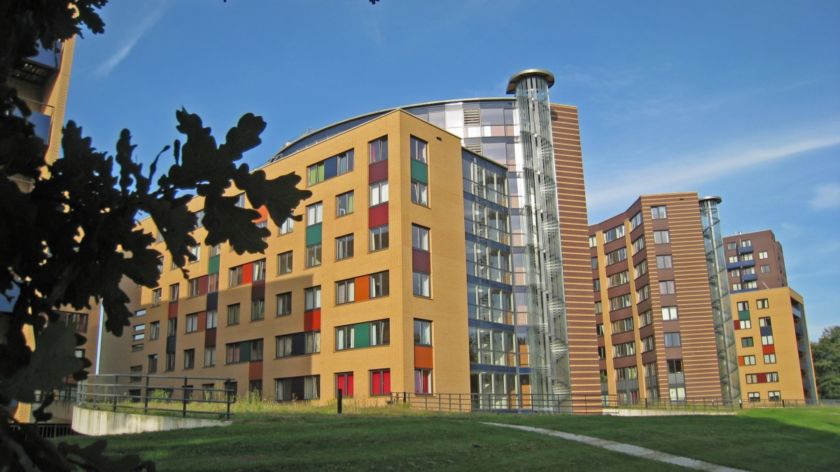Internationals on consequences of SSH& short-stay contracts: ‘I was homeless’
-
 At Sterrenbosch, Dutch and international students live together.
At Sterrenbosch, Dutch and international students live together.
Many international first-year students renting with SSH& receive short-stay contracts for a year that cannot be cancelled on a monthly basis. One consequence of this rule is that many students don’t manage to find new housing after their old contract expires. Two international students talk about their experiences. ‘You feel so helpless.’
Besides working with regular rental contracts, SSH& also works with so-called short-stay contracts that are usually running for six months to a year. In 2020, 1.370 students received those contracts. These don’t fall under regular Dutch rental law and are mainly intended for exchange students. However, short-stay contracts are also given to degree-seeking international students who receive housing help from the university during their first year or are offered in SSH&’s lottery system. Because the contracts cannot be cancelled on a monthly basis, many students feel trapped. They are either forced to pay double rent for a number of months or are not able to find new accommodation after the contract expires.
In Nijmegen’s city council, the PvdA recently asked for attention for the problems that arise from the short-stay contracts. However, the Board of Mayor and Aldermen, as well as Radboud University, sees no reason to change the rules. A disappointing outcome for international students. Two of them talk about their experiences with SSH&’s short-stay contract system.

Marie-Sophie Simon (Computing Science student from Germany)
‘I moved to Nijmegen in 2018 and signed a short-stay contract with SSH& for my first year. This was my first room, so I was very happy with it, but I always knew that I had to move out after a year. The only moment you can quit the contract before its expiration is at the end of November for the end of January. But at the end of November, I had barely even settled in Nijmegen. I did not quit back then. But because you cannot quit the short-stay contracts on a monthly basis, I couldn’t start looking for a new room too early in the year. And by the time I could start looking, many new Dutch and international students were doing the same – and I didn’t manage to find a room.’
‘So, after my short-stay contract ended, I was effectively homeless for a month. It made me feel so helpless, I really remember that. Because you don’t know for how long you’re going to be homeless. You don’t know whether you’re going to find something. And, if you do, whether you can afford it. You’re stuck in a state where your parents can’t help you, the university doesn’t help you and the study advisor tells you to try SSH& who in turn tells you that that’s a problem every international is facing.’
‘I think the important thing to realise is that this is very much a well-being problem. The university has put a lot of focus on well-being lately, but if they really do, then they should connect those two dots. I like that Radboud is an international university, I think everyone gains from that. But if you have internationals from all over the world, you need to make it possible for them to find a place here. They do that for the first year and I think that’s great, but the fact that you then cannot quit the contract at any point, makes it really difficult to find a new accommodation.’

Jakob Jung (Comparative European History student from Germany)
‘I wasn’t able to find a room for the first two months of my first year. I live three hours away by train, but that wasn’t far enough to be eligible for housing support from the international office. Because of that, I signed up to the regular SSH& lottery system and applied for rooms. Rooms with short-stay contracts were eventually the only ones that had only few people applying for them and therefore a realistic chance for me to get in. After two months, there was an increased pressure to get a room here.’
‘After the end of my contract, I was in the financial position to pay double rent for half a month. But other internationals are not that lucky. I know of some people who are currently losing all their savings because they can’t commute and can’t find a room and have to stay at an Airbnb. And even if you can theoretically commute, it’s often not feasible. Internationals are often not eligible for free public transport – neither in the Netherlands nor in their home country. So, when I have to commute to Germany, even with a discount card I pay for, it costs approximately 30 euros for a one-way ticket. Last semester, I had to attend classes on campus four times a week, which means I would have almost 1.000 euros in transportation costs per month if I didn’t have a room here.’
‘In my opinion, the cancellation policy of the short-stay contracts is a big part of the problem. If you could cancel on a monthly basis, you could apply for permanent rooms throughout the year instead of having to focus on the summer when the housing market is already quite overloaded. Right now, it’s almost inevitable to either be without a place to stay for some time or to pay double rent. I also think that the university should communicate clearer what the housing situation here is like and where you can turn to when looking for housing. Right now, the only available source is a pdf document with websites where half of the links were expired when I looked it up. And if I would have known beforehand what the situation would really be like, there is a good chance I would have not chosen to study in Nijmegen.’



